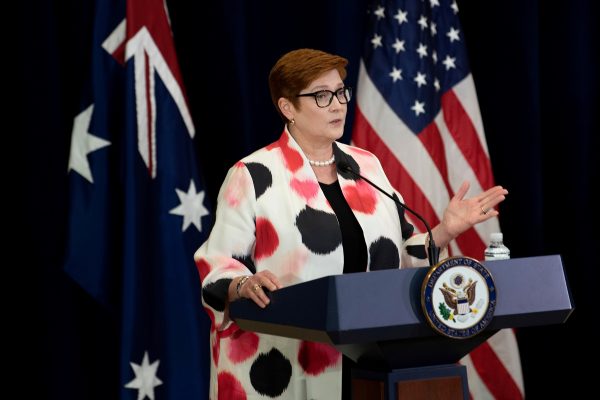The legislation requires public universities, local councils and state governments to notify the Australian government of any arrangements with foreign entities: governments, departments, agencies, authorities and some universities. The legislation defines ‘arrangements’ as anything in writing, whether or not legally binding. Arrangements will be recorded in an online public register. The Minister for Foreign Affairs can invalidate an arrangement if it’s considered likely to adversely affect Australia’s foreign relations or be inconsistent with Australia’s foreign policy. The minister has the power to vary or invalidate international arrangements, including retrospectively, and there’s no process for appeal or review.
The draft legislation was strongly criticised for its authoritarian-sounding aim of having Australia ‘speak with one voice’. Speculation has been that the target of the legislation is the state of Victoria’s Memorandum of Understanding with China’s Belt and Road Initiative, with universities a late addition. The law makes provisions to impose the same requirements on other entities, without the need for new legislation. So it would be easy to apply this regime to other institutions, such as non-government organisations or sporting bodies — the subject of an unsuccessful amendment. Corporations that operate on a commercial basis are explicitly excluded.
It is possible that state governments will mount a constitutional challenge. They didn’t engage with the Australian Parliament’s Senate inquiry process, suggesting they might think the best option is to challenge the law once passed. Yet, this likely would not assist territory governments, local councils and public universities.
Once the government brings the legislation into force, state and territory governments have three months to notify existing arrangements while local governments and universities have six months. For future arrangements, the process will depend on the type of entity involved. The requirements are toughest on agreements between state governments and foreign governments where proposed arrangements cannot be entered into without the minister’s approval. For other arrangements, proposals and agreements must be notified. The minister may invalidate an arrangement, even if it was previously given approval to proceed.
Universities were particularly vocal about the potential negative impact on the benefits that internationally-engaged universities bring for individuals, institutions and wider society. A Senate inquiry received 33 submissions from the higher education sector setting out problems with the law. These include an increased compliance burden, the risk of lost opportunities and the creation of a disincentive for international partners to engage with Australian universities. Peak body Universities Australia estimated that over 10,000 agreements might have to be reviewed.
There was one amendment in response. While all agreements with foreign governments will still be vetted, university-to-university arrangements will only have to be notified if the foreign university does not have institutional autonomy. The key test is whether a foreign government is in a position to exercise substantial control over the university.
A university fails the autonomy test if any of three reasons apply. One, if a majority of members of the university’s governing body are required to be part of the political party that forms the government. Two, if education provided or research conducted at the university is required to adhere to, or be in service of, political principles or doctrines of the government or political party. Three, if the university’s academic staff are required to adhere to or be in service of political principles or doctrines in their teaching, research, discussions, publications or public commentary.
The legislation will likely cover all universities in some countries, like Vietnam and China, as well as some bodies like the US Naval War College. Australian universities will need to examine their university partners one-by-one to see if they meet this test. If the university partner doesn’t have sufficient autonomy, then any arrangement will need to be notified. This includes student exchange, research, joint degrees and academic conferences.
Where an arrangement involves a foreign government, the Australian government needs to be notified, regardless of the status of any university partner. This applies to academic conferences receiving sponsorship from a foreign government or a joint research project funded by a government grant.
Further advice on complying with the new legislation has been promised from a new Foreign Arrangements Taskforce established in the Department of Foreign Affairs and Trade (DFAT) to implement the legislation. Despite DFAT’s funding being at the lowest in Australia’s history, AU$25 million (US$18.7 million) has been reallocated for this from other tasks. The only amendment made to the legislation by the Labor opposition was to require the minister to prepare an annual report on decisions made. The opposition abandoned an amendment to require judicial review.
This legislation is a mistaken step. International engagement by many voices gives multiple points of connection to the world. Australian universities, councils and state governments will have to work hard to ease the burden on international partners to ensure it doesn’t discourage them from engaging with Australia.
Melissa Conley Tyler is a research fellow at the Asia Institute, University of Melbourne.

